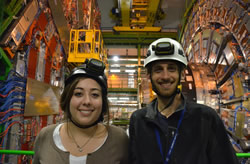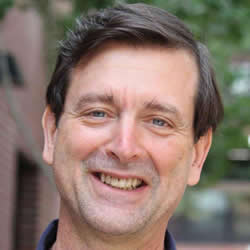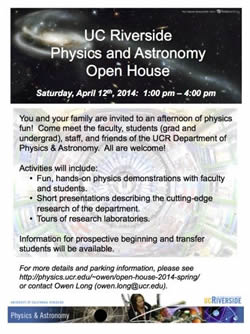HiPACC Education/Public Outreach Press Room. From: UCR
The Education/Public Outreach Press Room highlights opportunities made available to K-12 or university students or the general public, to learn more about astronomy and computational or data science in all fields, offered by the UC campuses and DOE laboratories comprising the UC-HiPACC consortium. The wording of the short summaries on this page is based on wording in the individual releases or on the summaries on the press release page of the original source. Images are also from the original sources except as stated. Press releases below appear in reverse chronological order (most recent first); they can also be displayed by UC campus or DOE lab by clicking on the desired venue at the bottom of the left-hand column.
September 22, 2014 — Finding answers to basic questions about the Universe

Elizabeth Kennedy and Jesse Heilman are two UC Riverside graduate students working at CERN, Switzerland. Credit: Sarah Charley/CERN
UCR 9/22/2014—Hundreds of graduate students from around the world work at CERN in Switzerland, home to the powerful particle accelerator the Large Hadron Collider (LHC). Among them are UC Riverside physics and astronomy graduate students Jesse Heilman and Elizabeth Kennedy, who are working on the Compact Muon Solenoid (CMS) experiment, a large particle-capturing detector. Hellman said: “CMS, of which UCR is a founding member, is one of two experiments at the LHC that has the capability to make measurements on things such as the Higgs boson. It is designed to sense a very broad range of phenomena and act as the most powerful microscope that our species has ever constructed.” Kennedy said: “Ambitious experiments require advancements in everything from computing power and data storage to superconducting magnets, so new and better technology comes from the demands of the field of experimental particle physics. Additionally, we train young scientists in not only particle physics, but general scientific research, engineering, and computer science.”

Read full UCR Press Release
April 15, 2014 — What does past global warming teach us?

Scott L. Wing is Curator of Fossil Plants in the Department of Paleobiology at the National Museum of Natural History. (Credit: National Museum of Natural History)
UCR 4/15/14 — Human emissions of greenhouse gases are altering environments and climate globally, and will continue to do so for many thousands of years into the future. The past event that best mirrors present-day warming occurred 56 million years ago and is called the Paleocene-Eocene Thermal Maximum (PETM). The PETM began with a geologically sudden release of an amount of carbon roughly similar to that in modern fossil fuel reserves, causing global warming of 4-8 degrees Celsius. Climatologists estimate the rate and magnitude of future climate change using general circulation models (GCMs). Biologist Scott L. Wing uses fossil plants to reconstruct past climates and local environments, which can reveal GCM strengths and weaknesses. In a free public lecture on Wednesday, April 23, at UC Riverside, Wing will discuss a large team of paleobotanists adding data on fossil plant assemblages to a Web-accessible database maintained at the National Center for Ecological Analysis and Synthesis—a database that will allow scientists to better quantify changes in the diversity and composition of terrestrial floras across the whole history of life on land.
Read full UCR Press Release
March 25, 2014 — Physics and astronomy to host annual open house on April 12

Flyer for the 2014 physics and astronomy open house
UCR 3/25/14 — The Department of Physics and Astronomy at UC Riverside will host its annual open house on April 12, 2014 from 1–4:30 p.m., allowing visitors to have one-on-one interactions with faculty and students and get to know all about the cutting-edge research the department conducts. Fun, hands-on demonstrations of electricity, magnetism and sound/music—which have proven popular with children—will take place in the courtyard and inside the Physics Building. Presentations that showcase UCR research will be held in the lobby and classrooms of the Physics Building. The 20-minute presentations on astrophysics, cosmology and condensed matter physics will start at 2 p.m., take place in Room 3041 (the Reading Room), and be given twice; the talk on high energy physics will be ongoing in the lobby. Admission and parking are free.
Read full UCR Press Release


